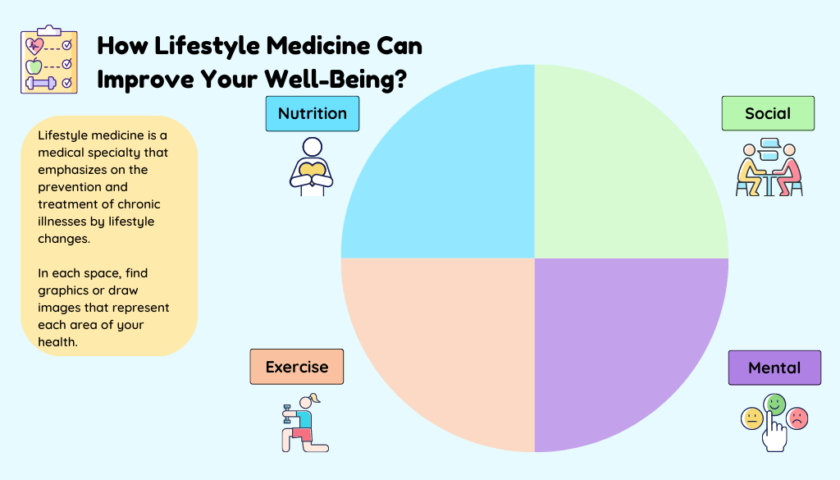Lifestyle Medicine is a healthcare strategy that focuses on treating the underlying causes of disease and sickness via lifestyle modifications. This article will go through a detailed approach to living a healthy life and the six pillars of lifestyle medicines: diet, physical exercise, sleep, stress management, social connection, and environment.
Definition of Lifestyle Medicine:
Lifestyle medicine is a medical specialty that focuses on preventing and treating chronic conditions via dietary and lifestyle modifications.
“Lifestyle medicine is the prescription we all need to take charge of our health.”
David Katz: “Lifestyle medicine is the evidence-based practice of helping individuals and families adopt and sustain healthy behaviors that affect health and quality of life.” – American College of Lifestyle Medicine.
Lifestyle medicine is an evidence-based strategy for prevention and treatment based on the notion that a healthy lifestyle is crucial. The purpose of lifestyle medicine is to encourage patients to undertake long-term health coaching and wellness improvements. Lifestyle medicine practitioners use counseling, education, and behavior modification strategies to assist patients in accomplishing these changes.
Integrative medicine is a newer profession, but it is increasingly becoming recognized as an effective approach to prevention and treatment. The American Medical Association passed a resolution urging doctors to include lifestyle medicine in their practice in 2013. There are several arguments for including lifestyle medicine in your healthcare plan. Lifestyle medicine has the potential to:
- Boost your general wellness and well-being.
- Try and reduce your resistance to chronic diseases
- Assist you to manage chronic problems
- Enrich your quality of life
The 6 Pillars of Lifestyle Medicine:
The six pillars of lifestyle medicine are a balanced diet, regular physical activity, enough sleep, stress management, avoidance of dangerous behaviors, and social support.
Following are the six major pillars of healthy lifestyle medicine:
Nutrition:
There are several strategies to live a better life, but nutrition is one of the most essential. Consuming a range of healthful meals, such as fruits, vegetables, whole grains, and healthy fats, is critical for optimal health. A good diet can help lower your chance of acquiring chronic conditions, including heart disease, stroke, and type 2 diabetes.
It might also assist you in controlling your weight. Various dietary standards might assist you in selecting the ideal meals for your health. One example is the United States Department of Agriculture’s (USDA) Dietary Guidelines for Americans. This text suggests eating various nutrient-dense foods, such as fruits and vegetables, whole grains, low-fat dairy, lean protein, and healthy fats.
“Nutrition is not low-fat (Nutritional Analysis). It’s not low-calorie. It’s not being hungry and feeling deprived. It’s nourishing your body with real, whole foods so that you are consistently satisfied and energized to live life to the fullest.” – Darya Rose
Darya Rose is a neuroscientist and author who focuses on the science of healthy eating and the importance of eating real, whole foods for optimal health.
The USDA’s MyPlate is a useful tool for selecting healthy meal choices. This visual guide indicates how much of each food category you should consume at each meal. For example, half of your plate should be fruits and vegetables, and the other half should be grains and protein.
In addition to eating a healthy diet, you may adopt additional lifestyle modifications to reduce your risk of a chronic condition. They include maintaining a healthy body weight, engaging in regular physical training, and refraining from using cigarettes. These modifications can help you live a healthier and longer life.
Exercise:
We are all known that exercise is beneficial to our well-being. It contributes to our bodies’ health and intellect’s sharpness. So, exactly, what is exercise?
Any physical activity that gets your body moving and your heart rate up is considered exercise. A short walk around the block or a game of catch with your children will suffice. The essential thing is to select an activity that you like and can commit to. That way, you’re more likely to include it in your daily routine. Exercise has several advantages, including:
- Losing fat or maintaining a healthy body weight
- Lower blood pressure
- Reduced chance of cardiovascular disease, stroke, and diabetes
- Stronger bones and muscles
- Increased energy and stamina
- Improved mental well-being and moods
So, what are you waiting for? Get up and begin going!
Stress Management: A Foundation of Stress Reduction:
It is no secret that stress may be harmful to our health. It is, in fact, one of the foundations of lifestyle medicine. Sleep optimization is the medical specialist concerned with preventing and treating chronic illnesses via developing healthy lifestyles. There are several stress-reduction techniques, and what works for one person may not work to other. Nonetheless, certain basic lifestyle adjustments might aid in stress reduction.
These are some examples:
- Getting enough sleep: Sleep is essential for our general health and well-being and may be especially beneficial in stress management. Every night, make an effort to get 7-8 hours of sleep.
- Eating a healthy diet: A well-balanced diet gives our bodies the necessary nutrients to work effectively. It can also benefit with stress reduction.
- Exercise: Exercise is a tremendous stress reducer. It causes the production of endorphins, which have mood-boosting properties.
- Spending time with loved ones: Spending time with loved ones may reduce stress and encourage happy feelings.
- Relaxation techniques: Yoga, meditation, and breathing deeply are almost all relaxation techniques that help relieve stress.
The time to relax is when you don’t have time for it.” – Sydney J. Harris
Sydney J. Harris was an American journalist and author who believed in the importance of taking breaks and prioritizing relaxation as a key component of stress management.
Sleep:
We know the importance of a good night’s sleep for our health and well-being. But did you know sleep is equally essential for leading a healthy life?
The National Sleep Foundation recommends that individuals sleep for 7-9 hours per night. Unfortunately, many of us aren’t getting sufficient shut-eye. In reality, one in every three American adults does not get enough sleep continuously. There are multiple reasons why sleep is so essential for our health. For starters, sleep is essential for our immune system. When we don’t get enough sleep, our bodies are less able to fight illness as efficiently. Sleep is also essential for maintaining our mental wellness. Sleep deprivation can raise anxiety and depression. It can also impair our capacity to focus and make decisions.
But most importantly, sleep is essential for our physical health. Our bodies cannot repair and regenerate properly when we don’t sleep enough. This can lead to several health problems like heart disease, diabetes, and obesity.
If you’re not getting enough sleep, there are a few things you can do to help improve your sleep habits. First and foremost, make a consistent sleep pattern. Every day, including on weekends, go to bed and wake up at the same time. Second, create a relaxing bedtime routine. This might include taking a warm bath, reading a book, or stretching gently.
And finally, make sure to create a sleep-friendly environment in your bedroom. This means keeping the room dark, cool, and free of noise and distractions. See your doctor if you’re having trouble sleeping. They can assist you in determining any underlying problems and recommending treatment alternatives.
Social Connections:
Have you ever felt isolated, alone, or like you don’t fit in? If so, you’re not alone. In the United States, isolation and loneliness is on the upswing. According to a study by Cigna, nearly half of Americans report feeling lonely.
Isolation may have serious consequences for our health. Studies have linked social isolation to a greater risk of premature death and other health problems like heart disease, obesity, and depression. But it’s not all doom and gloom. There are things we can do to combat loneliness and improve our social connections.
Here are a few ideas:
- Make an effort to connect with others: Social interaction is key to combatting loneliness, whether reaching out to an old friend or meeting new people.
- Join a club or group: There are groups for just about everything these days. Find one that interests you and get involved.
- Volunteer: Giving back is a great way to connect to something larger than yourself.
- Get a pet: Pets may give everlasting affection and companionship.
- Use technology wisely: While too much time on social media can be detrimental, using it to connect with friends and family can be helpful.
If you’re feeling lonely, don’t hesitate to ask for help. There are many resources available to assist you in finding connection and purpose.
Positive Attitudes:
It has been said that attitude is everything. Your attitude can determine your success or failure in life. It can also determine your happiness and how you interact with the world. A cheerful outlook on life may make all the difference.
“Positive thinking will let you do everything better than negative thinking will.”
Zig Ziglar
What is a positive attitude? A positive approach is an optimistic view on life. It is a belief that good things will happen, and you can make them happen. It is a way of thinking that allows you to see the best in people and situations. A positive attitude is not just a state of mind but also a way of life. People with positive attitudes live their lives differently than those with negative attitudes. They see the world differently, and they interact with the world differently.
Positive people see the glass as half full, not half empty. They notice the positive aspects of individuals and circumstances. They believe that they can make a difference in the world. They are optimistic. They are happy, and they radiate happiness. Negative people see the glass as half empty. They see the bad in people and situations. They feel that the entire world is conspiring against them. They are pessimistic, and they radiate negativity.
A positive attitude is a choice. You can choose to see the world in a positive or negative light. You can choose to be hopeful or pessimistic. You have the option of being either pleased or dissatisfied. The choice is yours. A positive attitude will not solve all your problems, but it will help you see the world in a different, more positive light. It will help you to interact with the world more positively. And it will help you to find solutions to your problems.
If you have a negative attitude, it is time to change. It is time to see the world in a different, more positive light. It is time to choose to be optimistic. It is time to make the decision to be joyful.
How Lifestyle Medicine Can Improve Your Well-Being?

Lifestyle medicine is a medical specialty that emphasizes on the prevention and treatment of chronic illnesses by lifestyle changes. These interventions can include diet, physical activity, and other lifestyle changes. Lifestyle medicine is based on the premise that chronic diseases are largely preventable and that lifestyle is a major determinant of health. Therefore, behavioral change interventions seek to address the root causes of chronic diseases rather than just treating the symptoms.
There is growing evidence that complementary medicine can effectively prevent, treat, and even reverse chronic diseases such as obesity, diabetes, heart disease, and cancer. Lifestyle medicine is now considered the cornerstone of chronic disease prevention and treatment. There are many benefits to pursuing a healthier lifestyle, including improved well-being, increased longevity, and reduced healthcare costs. Lifestyle medicine can also help you feel your best, look your best, and have more energy to enjoy your life.
Overall, stress reduction is a powerful tool for improving your well-being. Healthy lifestyle behaviors can improve your physical and mental health, increase energy, and enhance your overall quality of life.
Practical Implications of Lifestyle Medicine:
The practical implications of lifestyle medicine are vast and can have a significant impact on individuals, communities, and healthcare systems.
Here are some practical implications of lifestyle medicine:
- Prevention of Chronic Diseases: Lifestyle medicine interventions can help prevent chronic diseases such as heart disease, diabetes, and obesity. This can lead to a reduction in healthcare costs and improve overall health outcomes.
- Reduction in Medication Use: Lifestyle medicine interventions can reduce the need for medication use in the treatment of chronic diseases. This can lead to a reduction in healthcare costs and improve patient outcomes.
- Improved Patient Outcomes: By incorporating lifestyle medicine interventions into patient care, healthcare providers can improve patient outcomes and quality of life.
- Health Promotion: Lifestyle medicine interventions can promote healthy behaviors, such as regular physical activity and a balanced diet. This can lead to improved health outcomes and reduce the risk of chronic diseases.
- Patient Education: Healthcare providers can educate patients on healthy lifestyle behaviors and the benefits of Holistic health interventions. This can empower patients to take an active role in their health and improve their overall well-being.
- Health Equity: Lifestyle medicine interventions can help address health disparities and improve health equity by promoting healthy behaviors and providing access to healthcare resources.
Building Healthy Habits:
Building healthy habits can be challenging, but it is possible with consistency, effort, and patience.
“We first make our habits, and then our habits make us.” – John Dryden
John Dryden was an English poet and playwright who believed that our habits have a powerful influence on our lives and wellbeing.
Here are some practical tips for building healthy habits:
- Start Small: Start with small, achievable goals to avoid feeling overwhelmed. For example, start with a 10-minute walk each day instead of an hour-long gym session.
- Be Specific: Be specific about the habit you want to build. For instance, state “I want to go for a 30-minute walk every day after work” rather than “I want to exercise more.”
- Track Your Progress: Keep track of your progress to stay motivated and celebrate small wins. You can use a habit tracker or journal to record your progress.
- Make it a Routine: Incorporate your new habit into your daily routine to make it a habit. For example, if you want to meditate daily, set a specific time to meditate.
- Find an Accountability Partner: Find someone who can support and hold you accountable for building healthy habits. This can be a friend, family member, or professional such as a coach or therapist.
- Be Patient: It takes time and effort to develop good habits. Don’t get discouraged if you experience setbacks. Instead, focus on progress, not perfection.
- Reward Yourself: Reward yourself for achieving milestones and accomplishing your objectives. This can help reinforce the habit and motivate you to continue.
Statistical Analysis:
Statistical analysis plays a crucial role in physical activity promotion research, helping to determine the effectiveness of lifestyle interventions on health outcomes. Using statistical analysis techniques, researchers can better understand the relationship between lifestyle behaviors and health, leading to improved health outcomes and better overall well-being.
Example: A study was conducted to determine the effectiveness of a lifestyle medicine intervention on weight loss in obese individuals. The study included 100 participants, who were randomly assigned to either the intervention group or the control group. The intervention group received a 12-week lifestyle medicine intervention, which included dietary changes and physical activity recommendations, while the control group received standard care.
Statistical analysis was conducted to compare weight loss between the two groups. Descriptive statistics were used to summarize the characteristics of the sample, such as age, gender, and initial weight. Correlation analysis examined the relationship between initial weight and weight loss.
Regression analysis was used to examine the relationship between nutrition therapy intervention and weight loss while controlling for factors such as age and gender. Survival analysis was used to examine the time it took for participants in the intervention group to achieve significant weight loss.
Finally, a randomized controlled trial design was used to determine the overall effectiveness of the lifestyle medicine intervention on weight loss. The study results showed that the lifestyle medicine intervention was significantly more effective in promoting weight loss than standard care, with participants in the intervention group losing an average of 10 pounds over the 12 weeks.
Case Study of Lifestyle Medicine:
Patient James Horner is a 43-year-old male diagnosed with high blood pressure, high cholesterol, and type 2 diabetes. He is overweight and sedentary and eats a diet high in processed foods and saturated fats. His doctor recommends that he begin a Lifestyle Medicine program to address these health concerns. The Chronic disease prevention program includes a comprehensive approach to addressing the patient’s lifestyle factors, including:
- Nutrition: The patient is referred to a registered dietitian who helps him develop a healthy diet plan focusing on whole foods, fruits, vegetables, lean protein, and healthy fats. The dietitian also provides guidance on portion control and healthy cooking methods.
- Physical activity: The patient is encouraged to engage in regular physical activity, such as walking, swimming, or cycling, for at least 30 minutes per day, five days per week. The program includes access to a physical therapist who provides guidance on appropriate exercise and helps the patient develop an exercise plan.
- Stress management: The patient is referred to a stress management program that includes mindfulness practices, deep breathing, and yoga techniques. The program also includes education on the effects of stress on health and how to manage stress in daily life.
- Sleep: The patient is educated on the importance of good sleep hygiene and provided with guidance on developing a healthy sleep routine.
- Behavioral change:
- The program includes education on behavior change strategies, such as setting achievable goals, tracking progress, and celebrating successes.
After six months in the Lifestyle Medicine program, James Horner has significantly improved his health. His blood pressure and cholesterol levels have decreased, and his blood glucose levels are under control. He has lost weight and is feeling more energetic. He can now engage in physical activity regularly and has developed healthy habits around food and sleep. He reports feeling less stressed and more in control of his health.
This case study highlights the potential benefits of a comprehensive Lifestyle Medicine program in addressing chronic health conditions and promoting overall health and well-being. Patients can improve their health and quality of life by addressing multiple lifestyle factors, such as nutrition, physical activity, stress management, and sleep.
Facts and Sources:
Fact 1: Lifestyle medicine was developed to combat the emerging crisis related to the rise of NCDs, which account for approximately 41 million deaths (71%) globally each year (WHO, 2021). Click To Read More
Fact 2: “Moreover, experiments done at Stamford have shown that a 20-minute walk can increase creative output by 60%. Click To Read More
General FAQs:
How can Lifestyle Medicine help prevent chronic diseases?
Lifestyle Medicine can help prevent chronic diseases by addressing underlying lifestyle factors such as poor nutrition, lack of physical activity, stress, inadequate sleep, and unhealthy habits. By focusing on these modifiable risk factors, lifestyle modification interventions can help reduce the incidence and severity of chronic diseases, including heart disease, type 2 diabetes, obesity, and certain types of cancer.
What is the role of diet in Lifestyle Medicine?
Diet plays a central role in Integrative medicine as it is a major modifiable risk factor for chronic diseases. A whole-food, plant-based diet emphasizing nutrient-dense foods can promote health and prevent disease. Dietary interventions in Lifestyle Medicine can also address food addiction, emotional eating, and other unhealthy eating habits.
What is the connection between stress and Lifestyle Medicine?
Stress is a significant contributor to chronic disease and plays a crucial role in Lifestyle Medicine. Lifestyle Medicine interventions, such as mindfulness practices, relaxation techniques, and stress management strategies, can help individuals develop resilience to stress and prevent its negative health effects. Addressing stress can also improve sleep, mood, and overall quality of life.
What are some resources for learning more about Lifestyle Medicine?
There are various resources available for learning more about Lifestyle Medicine, including the American College of Lifestyle Medicine (ACLM), the Lifestyle Medicine Global Alliance, and the International Board of Lifestyle Medicine. These organizations offer online courses, certification programs, webinars, conferences, and research articles to provide evidence-based information on Lifestyle Medicine.
To Cut a Long Story Short:
Finally, the lifestyle medicine pillars provide a complete framework for promoting and sustaining optimal health and well-being. Integrative medicine stresses the significance of treating lifestyle variables to prevent and treat chronic diseases by concentrating on six important areas: healthy food, physical exercise, stress management, restful sleep, social connections, and positive attitudes.
Individuals can minimize their chance of acquiring chronic diseases such as heart disease, diabetes, and cancer by creating healthy behaviors in these six areas and increasing their overall quality of life. Lifestyle medicine treatments successfully prevent and treat chronic illnesses, making them a viable option for improving public health.
The pillars of lifestyle medicine also highlight the necessity of individualized care, acknowledging that each individual has distinct health requirements and preferences. Individuals may take charge of their health and accomplish their health objectives by collaborating with healthcare practitioners to establish tailored lifestyle medicine strategies.
Ultimately, the health promotion pillars offer a comprehensive and evidence-based approach to improving health and well-being, emphasizing the significance of addressing lifestyle variables in illness prevention and management. Individuals may live healthier, happier lives and lower their risk of chronic illness by adopting good practices in five important areas.





